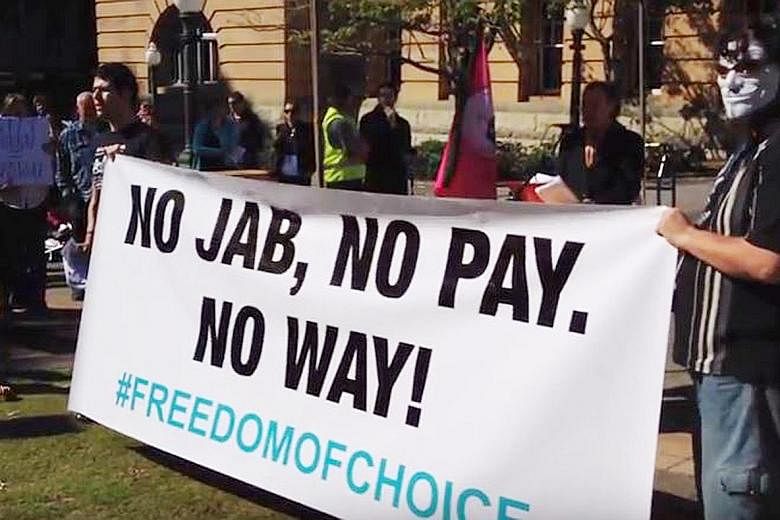Australia has adopted a controversial scheme to force parents to vaccinate their children: either agree to the immunisations or government payments and welfare benefits will be withheld.
The so-called "no jab, no pay" policy appears to be working, however, as there have been almost 6,000 extra immunisations since it began this year. The vaccination rate for all children aged between one and five has increased to about 93 per cent, up from 90 per cent.
The policy involves keeping up to A$15,000 (S$15,300) in benefits and payments from parents who do not have children vaccinated, including those who refuse on religious or philosophical grounds. It does not apply to children who cannot be vaccinated for medical reasons.
The federal government introduced the measure in response to falling immunisation rates, caused partly by the growing popularity of the anti-vaccination movement.
These "anti-vaxxers" say that standard vaccines, which immunise against 16 diseases including polio, mumps and measles, can cause autism and pose unnecessary risks to children - claims that have been dismissed by scientists.
The Minister for Social Services, Mr Christian Porter, said the "no jab, no pay" policy was working and the government was hoping to achieve a 95 per cent immunisation rate. He said conscientious objector numbers were dropping, accusing them of putting the health and safety of children at risk "on the basis of personal beliefs and medically unfounded conspiracies".
"Vaccination rates had fallen to such a historically low level that we were seeing the re-emergence of diseases we had been free of for years," he told ABC News on Sunday.
Falling immunisation rates have been linked to recent outbreaks of whooping cough and measles. Some areas have immunisation rates as low as 55 per cent. Several of these areas, such as those in the north coast of New South Wales, are places where alternative therapy is popular and many are sceptical of modern medicine.
Despite the success of the programme, some experts say coercing parents is unfair and the focus should be on education and improving access to medical services which provide vaccinations.
An Australian expert on vaccinations, Associate Professor Kristine Macartney of the University of Sydney, said more than half of parents who do not vaccinate their children fail to do so because of "access issues". These parents may find it hard to access a medical service because it is far away or they have large families or come from non-English speaking backgrounds, she said.
"It is ultimately a good result if more children are being immunised," she told The Straits Times. "But we need to make sure vulnerable families are not being disadvantaged if they have not been able to get their children up to date."
Experts say the anti-vaccination movement has been able to reach a greater audience in recent years with the Internet and the reported support of celebrities such as the actors Jim Carrey, Alicia Silverstone and Charlie Sheen. But a new study in Australia has found the proportion of anti-vaccination children has remained stable since 2001 at about 3.3 per cent.
Anti-vaccination activists have been trying to raise funds to mount a legal challenge against the policy in the High Court. The Australian Vaccination-skeptics Network has described it as "unconstitutional, immoral and illegal". The Government has dismissed the claim.
Immunisation in Australia is provided by doctors and nurses at medical practices, local councils and community-based clinics. It is free of charge, though some doctors charge a fee.
Since 1996, the government has kept a register of all vaccinations for children aged under seven who live in Australia. More than 148,000 children not up to date with immunisations on the national register were now meeting the requirements since the introduction of the new policy on Jan 1.
Prof Macartney said she supported "a range of efforts to improve immunisation coverage rates".
"It is also about… providing vaccines for free for older children and more funding to GPs to check records and ensure children are caught up," she said.

